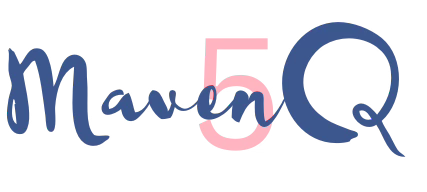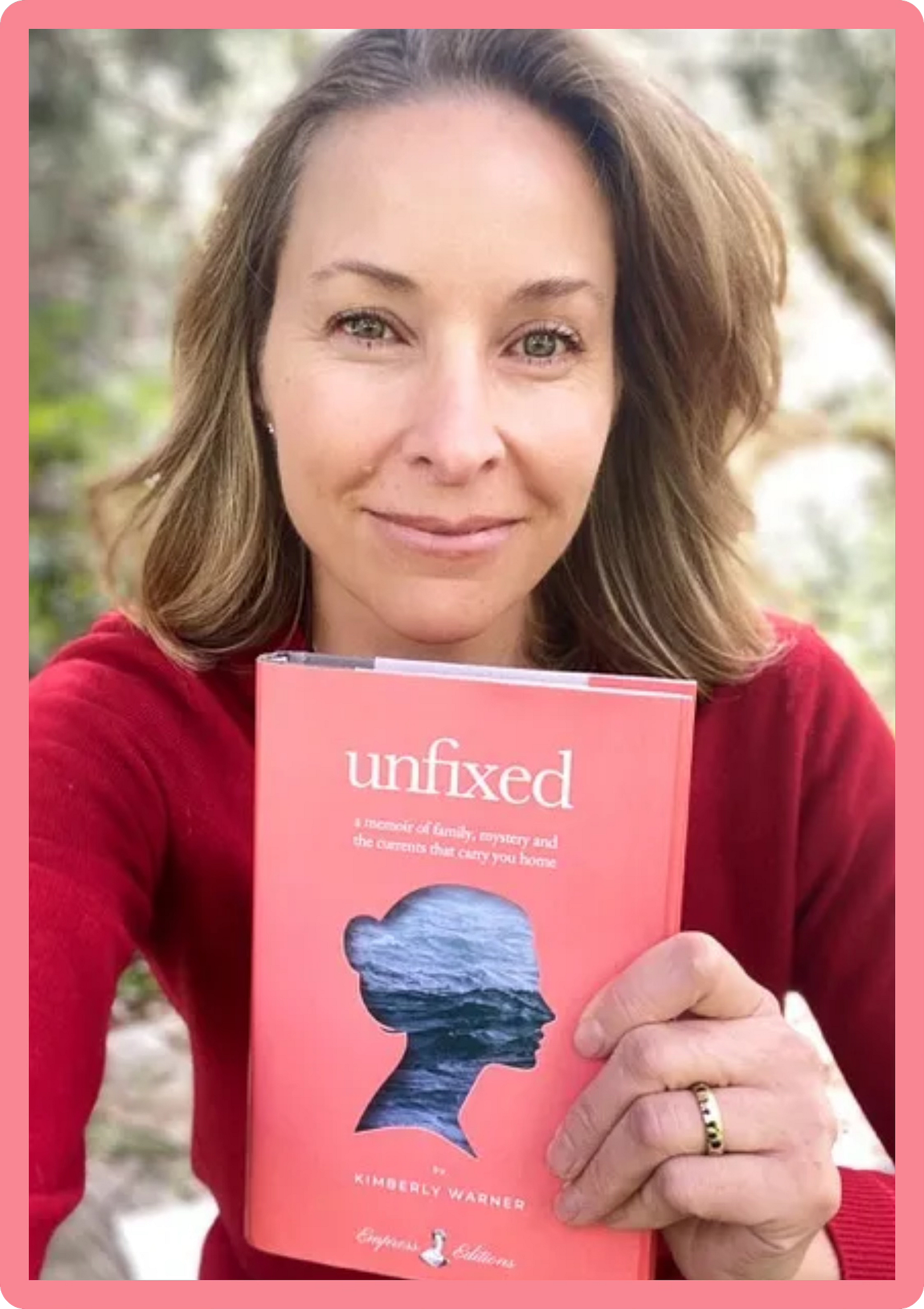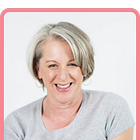Maven5Q Kimberly Warner
loosening her grip, staying curious, and finding peace in the storm.
Kimberly Warner
Memoir preorder link
Kimberly Warner is a filmmaker, writer, and patient advocate whose work explores what it means to live fully in a body that doesn’t always feel well. After studying pre-med and biology at Colorado College and pursuing graduate training in naturopathic and classical Chinese medicine, she left her white coat behind and picked up a camera instead—trading diagnostics for documentary and turning questions of health into stories of meaning.
In 2015, a rare neurological condition—Mal de Débarquement Syndrome—upended her sense of gravity and direction, quite literally. That seismic shift became the seed of Unfixed, a multimedia platform she founded to amplify stories of people living with chronic illness and disability. Since then, her work has grown into a celebrated portfolio of award-winning docu-series, short films, podcasts, and essays—all championing the radical notion that healing and brokenness can coexist.
Kimberly’s storytelling has earned honors from the Invisible Disabilities Association, HealtheVoices, and Life on the Level. She has screened at Harvard Medical School, contributed to innovative medical curricula, and serves on advisory boards that center the patient’s voice in health care and design.
She lives in rural Oregon with her husband, David, where they tend their small farm between creative projects. When she’s not editing films, harvesting calendula, or writing for her beloved Substack audience, she’s practicing what she preaches: loosening her grip, staying curious, and finding peace in the storm.
What is the most surprising part of being in this stage of life?
I’m surprised by how happy I am. The trenches of the last decade reordered my values and softened my state of mind. I used to pin my happiness to impossible conditions: being pain-free, constantly chasing big dreams, never hitting obstacles. But these days, it’s the little delights that sustain me. I relish simplicity and spaciousness, and I fiercely protect it.
While I never imagined I’d publish a memoir or run a film production company, these things emerged not from a five or ten-year plan but from a deep engagement with life as it revealed itself. Listening and responding. And sometimes I didn’t like what I heard! Enter ego tantrum. But allowing instead of resisting has become key to my happiness.
When I’m not working on films, essays, podcasts, or advocacy for Unfixed, you’ll find me harvesting calendula for my organic skin care line, sitting in the hen run tossing chard to my babes, captivated by evening grosbeaks and goldfinches at the feeder, walking my cats through the yard, fussing over houseplants, talking to wildflowers, and yes—hugging trees. This isn’t weekend whimsy. It’s my daily new cycle.
Decades of chronic illness taught me not to sweat the big stuff. Not to chase closure. To live the questions, and let that be enough.
What’s one new thing you’re trying to embrace in midlife?
Fog. Literal and figurative. Lately, I’ve noticed more brain fog, maybe it’s hormones, maybe it’s just the rewiring of an aging brain. It doesn’t stop me from working, but it does make it harder to stitch together clear sentences. My perfectionist doesn’t approve. She wants clarity, drive, differentiation. But I’m learning to listen to the fog instead of fight it.
Where once I feared the blankness, I now see it as invitation. Outside my window in Oregon, the landscape disappears into mist. Inside, my thoughts do the same. But to wait until the fog lifts to name its gifts would be like trying to photograph it after it’s gone. So I stand in the middle of it—grey-day, grey-matter—and ask: What is trying to be heard here?
I’m beginning to believe that fog isn’t failure, but a shift in perception. Like the redwoods, even the tallest among us benefit from cloud cover. I wonder if this too can sustain me. Maybe what looks like confusion is actually a loosening of boundaries. Maybe my thoughts are less transactional and more relational now. Less about control, more about communion.
When I’m foggy, I think more like a tree and listen more like a leaf. I step into the blur, and the blur steps into me. No hard lines, just voluminous shadows forgetting their form. The world becomes soft and interconnected. My mind doesn’t reach, it lands. It receives. And in that still, strange, quiet place, something unexpected often arrives. Not the answer I thought I needed. But a deeper kind of knowing.
If you could give yourself a piece of advice 20 years ago, what would it be and why?
Trying to fix everything in your body tells your nervous system you’re in danger—and that makes everything worse. Trust that your body is a thousand times wiser than you think. Relax into the mess, and yes, that includes the cat litter on the floor. The very thing you’re most afraid of might just be what saves you.
What’s something our generation had access to that you’d like to bring back?
Smartphone-free living. And while we’re at it—let’s bring back Spirographs too.
If the next 20 years of your life had a theme, what would it be and why?
If I’m being aspirational: non-human storytelling. Or thresh-holding. Or perceptual porosity. I want my writing to become more elemental, my life more animal. I want to rethread forgotten stories back into the human narrative—ones whispered by birds, root systems, lichen, rain.
We won’t heal this world through human ingenuity alone. We need to become inter-species collaborators and kin. That’s the work of the next 20 years: to listen more deeply to my more-than-human family and help translate their mycelial messages for the human heart. To practice thresholding where we live at the edge of change, where the self stays soft enough to become a bridge for non-traditional forms of communication.
Can we begin to shape a more relational ontology, one that understands the self not as a fixed, separate entity, but as a living ecotone? Ecotones are the rich, liminal spaces where ecosystems meet: the shore, the hedgerow, the edge of the forest. And we are that edge. We are where land meets land, where other beings come home to each other. To live as an ecotone is to dissolve the myth of separation. And maybe that’s how we begin to heal ourselves. And the planet.










Re: fog, I was thinking of Sally Mann's photographs of trees in the South misted and fogged. They're beautiful.
Spirographs!!